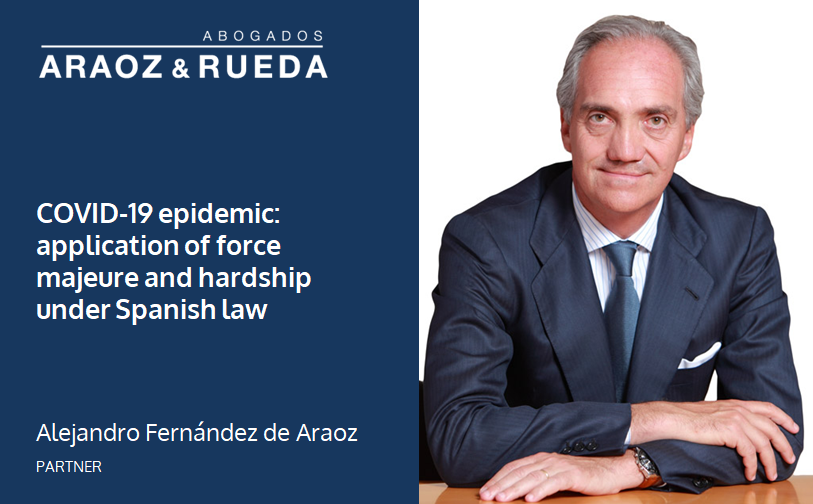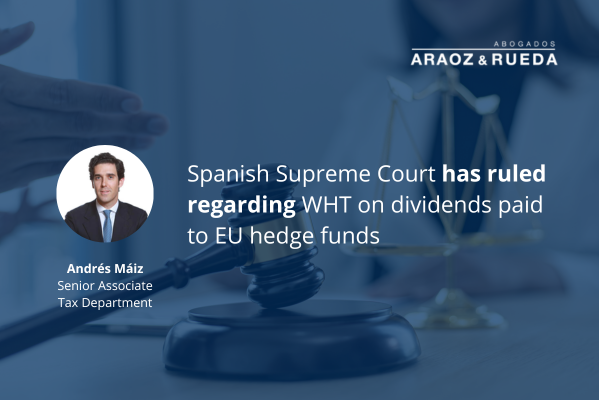1. Context
On 30 January 2020, the World Health Organization (WHO) General Director declared the outbreak of CoViD-19 (also known as Coronavirus), a public health emergency of international concern (PHEIC). In addition, on 11 March 2020, the WHO has officially declared the Coronavirus a pandemic. Finally, the Spanish Government has declared the official “state of alarm” which is an extraordinary situation allowing the public authorities to restrict basic individual rights such as free movement and endorsing mandatory quarantines periods.
The effects of the epidemic are already affecting the conduct of all activities, including the administration of justice, the exercise of individual freedoms, and the continuation of business operations. In particular, the consequences of the CoViD-19 outbreak may affect the ability or the willingness of one of the parties to a contract to perform its obligations thereunder.
In order to be prepared to face the challenges that the current circumstances present, companies should consider reviewing (at least) their crucial supply and customer contracts to identify possible weaknesses or exit routes and devise an appropriate strategy.
Certain key aspects to be considered are outlined below.
2. Force majeure
Article 1.105 of the Spanish Civil Code covers force majeure events. To be applicable, the fundamental characteristics of all the events covered by this provision are: (i) unpredictability and (ii) inevitability.
According to the case law of Spanish Courts, it must be an event that has not been caused by the parties and that is alien to the circle of activity of the parties or the nature of the contract, in which it bursts in like an external obstacle (lightings, war, civil strife, hurricanes, tornados, floods, and other similar situations). Notwithstanding the foregoing, it must be noted that, according with our case law criteria, both the unpredictability and the inevitability should be considered at the time of execution of the contract.
In addition to the Spanish Civil Code provisions, one could also take into account Article 79 United Nations Convention on Contracts for the International Sale of Goods of 1980 (“CISG”), which provides that a party is exempted from liability for damages only if the failure to perform is due, first, to an impediment beyond its control and, second, that it could not reasonably be expected to have taken the impediment into account at the time of the conclusion of the contract.
3. Hardship
Hardship refers to a change in economic circumstances which does not prevents a party from fulfilling its contractual obligations, but makes performance of the whole contract much less profitable for this party or even costly for this party, with the latter actually losing money because of the contract.
Spanish law does not have a specific provision dealing with hardship but the Supreme Court has developed such doctrine under the heading of rebus sic stantibus. It implies that a party is bound to perform a promised obligation, as long as the circumstances underlying the promise remain the same so it acknowledges the necessity of taking into consideration unexpected circumstances in the performance of a contract, either through its adaptation or termination.
Although the Spanish Supreme Court has crafted this doctrine many years ago, with the financial crisis of 2008, it was substantially developed. The fundamental characteristics of this doctrine are the following:
a. Change of circumstances occurred after the time of conclusion of the contract;
b.Unpredictability;
c.No fault;
d.Whether the agreement contemplated a risk sharing provision or the ability to terminate with a reasonable notice;
e.Excessively onerous.
The consequence is that the Courts will adjust the economic terms to what could be deemed “reasonable” in the light of the circumstances or even order termination of the contract. Having said this, Spanish courts tend to be strict in applying the principles of strict enforceability of contracts (past sunt servanda) and will tend to be restrictive in the application of this doctrine.
4. Impact of “material adverse change” (MAC clauses)
4.1 Acquisition/M&A Agreements: contracts governing the acquisition of businesses often condition the buyer’s obligation to complete the relevant transaction on no “material adverse change” (“MAC”) occurring between signing and satisfaction of all other conditions precedent to closing.
The language of these clauses may vary significantly, depending on a number of factors. These provisions may include events affecting, or reasonably expected to affect, the target company’s ability to run its business, the seller’s ability to meet its obligations under the relevant contract, or the specific conditions and prospects of the target company. On the other hand, these clauses may also set forth exceptions to the buyer’s ability to enforce them, by excluding changes affecting “general market conditions” (unless disproportionately hitting the target).
Whether the buyer can terminate an acquisition agreement based on the occurrence of a MAC condition will of course depend on the specific language of these provisions as well as on the future evolution of the outbreak. To the extent that the epidemic continues to be mostly limited to certain jurisdictions, for instance, a carve-out for industry-wide conditions might be insufficient to compel the buyer to complete the deal if the target is located in those jurisdictions.
4.2 Financing documents: In Spanish loan agreements, the occurrence of a MAC often entitles the lender not to fund the loan or, should the MAC occur after drawing of the loan, give rise to an event of default (entitling the lender to require the borrower to repay the loan in advance). However, given the uncertainty in the interpretation of MAC clauses as a matter of law, the limited information the lenders have on the borrower’s condition, and the risk of lenders’ liability arising from a wrongful acceleration, it is generally expected that lenders will be reluctant to refuse to fund or accelerate a loan solely based on the deemed occurrence of a MAC resulting from the CoViD-19 outbreak.
Alejandro Fernández de Araoz
Partner





